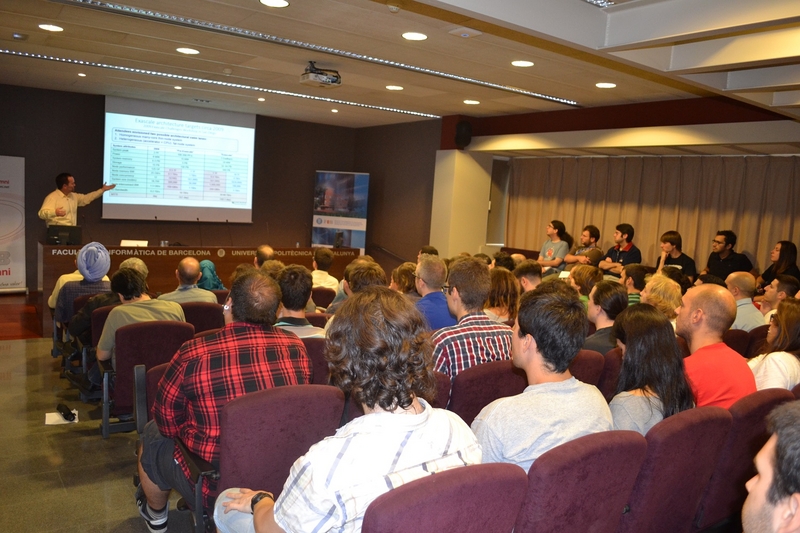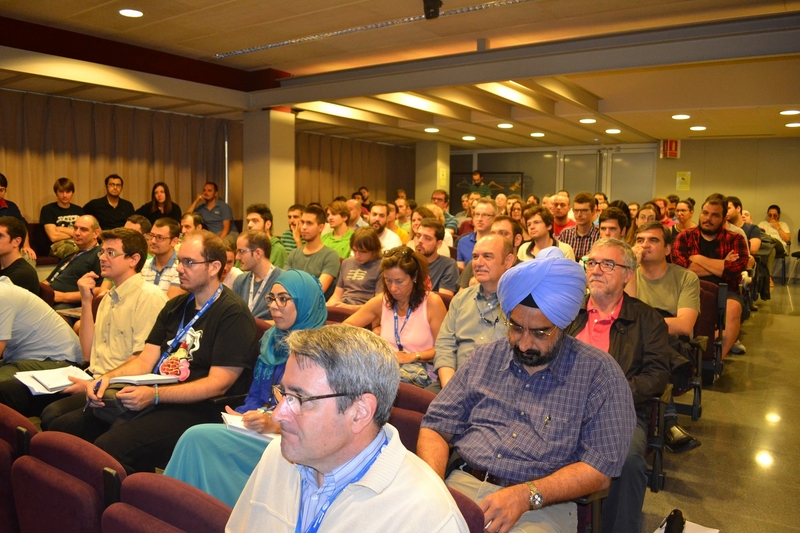Jeffrey S. Vetter, Oak Ridge National Laboratory and Georgia Institute of Technology, offered the talk entitled "Exploring Emerging Technologies for Extreme Scale HPC Architectures".
The Opening session of the 3rd season of Severo Ochoa Research Seminar Lecture Series (SORS) on Thursday, 10 September, at 11:00 in Sala d’Actes FIB was opened with welcome note by Josep Casanovas. The speaker was presented by Jesus Labarta.
Speaker: Jeffrey S. Vetter, Oak Ridge National Laboratory and Georgia Institute of Technology, http://ft.ornl.gov/~vetter/
Title: Exploring Emerging Technologies for Extreme Scale HPC Architectures
Date: Thursday, 10 September- 11:00
Venue: Sala d’Actes FIB
Abstract:
While architectures and programming models have remained relatively stable for almost two decades, new architectural features, such as heterogeneous processing, nonvolatile memory, and optical interconnection networks, will demand that software systems and applications be redesigned so that they expose massive amounts of hierarchical parallelism, carefully orchestrate data movement, and balance concerns over performance, power, and resiliency. This instability has led to two inevitable problems: decreased programmer productivity, and difficult performance prediction. In this talk, I will describe two solutions to these problems, respectively: our OpenARC compiler and runtime system, and our Aspen performance modeling language. First, OpenARC is a research compiler that supports OpenACC and OpenMP4, and can generate code in CUDA, OpenCL, and LLVM IR. OpenARC has enabled us to explore how to enable performance portability of applications across diverse architectures. Second, Aspen is a domain specific language for structured analytical modeling of applications and architectures. It is designed to enable rapid exploration of new algorithm and architectures. Once created, Aspen models can then be used for a variety of purposes including predicting performance of future applications, evaluating system architectures, informing runtime scheduling decisions, and identifying system anomalies.
Bio:
Jeffrey Vetter, Ph.D., holds a joint appointment between Oak Ridge National Laboratory (ORNL) and the Georgia Institute of Technology (GT). At ORNL, Vetter is a Distinguished R&D Staff Member, and the founding group leader of the Future Technologies Group in the Computer Science and Mathematics Division. At GT, Vetter is a Joint Professor in the Computational Science and Engineering School, and the Director of the NVIDIA CUDA Center of Excellence. His work has won awards at major conferences: Gordon Bell Prize at SC10, Best Paper Awards at the International Parallel and Distributed Processing Symposium (IPDPS) and EuroPar, Best Student Paper Finalist at SC14, and Best Presentation at EASC 2015. His recent books “Contemporary High Performance Computing (Vols. 1 and 2)” survey the international landscape of HPC. See his website for more information: http://ft.ornl.gov/~vetter/.







